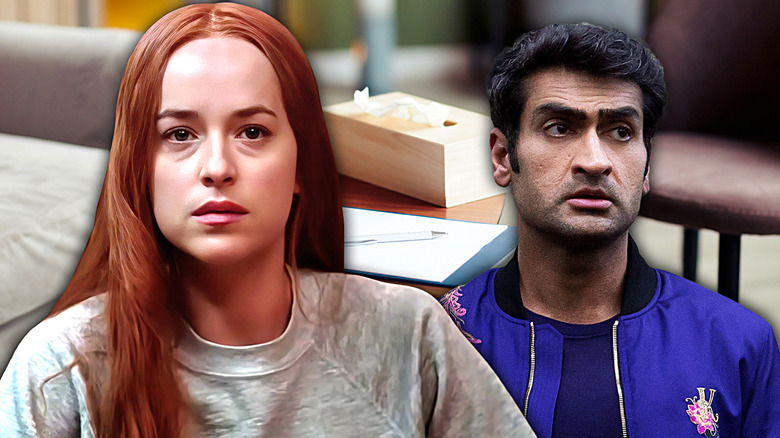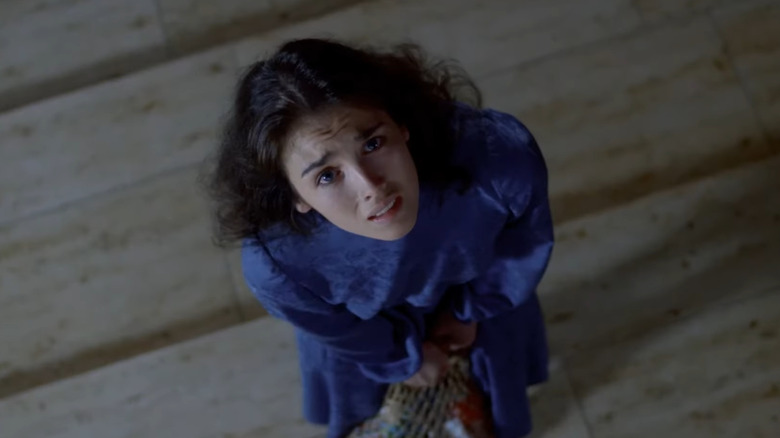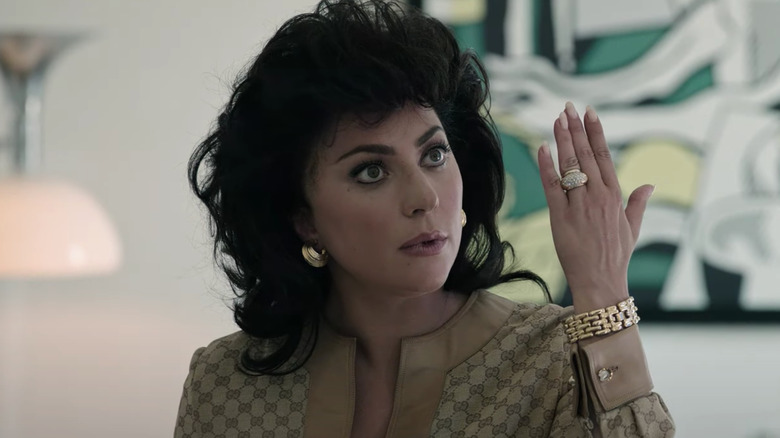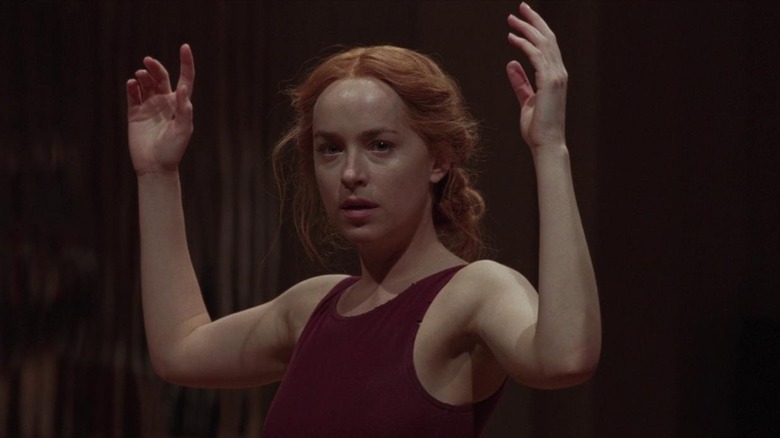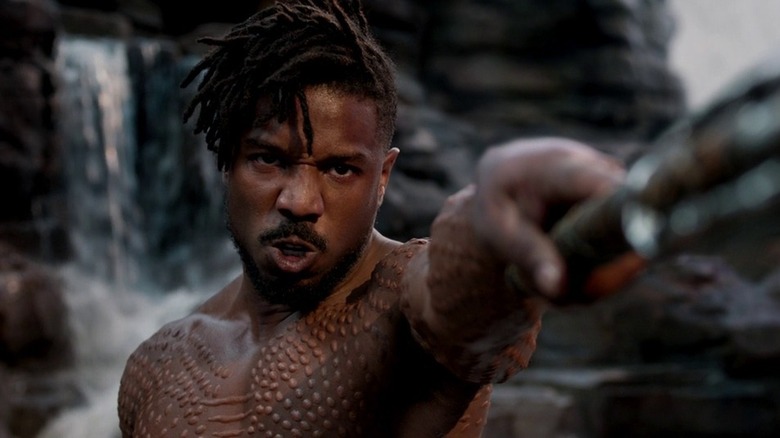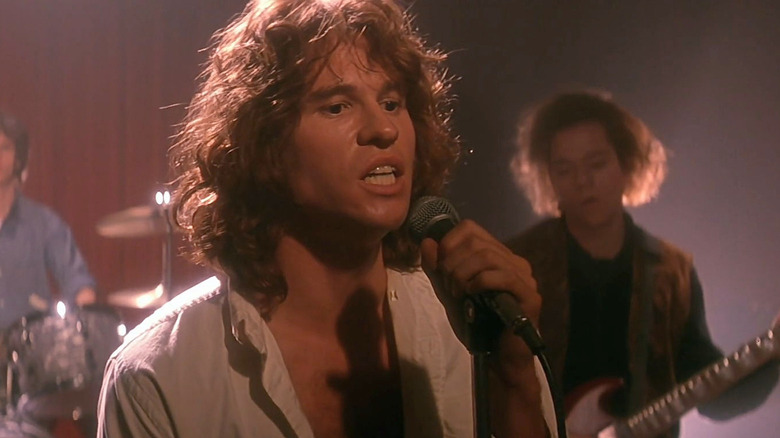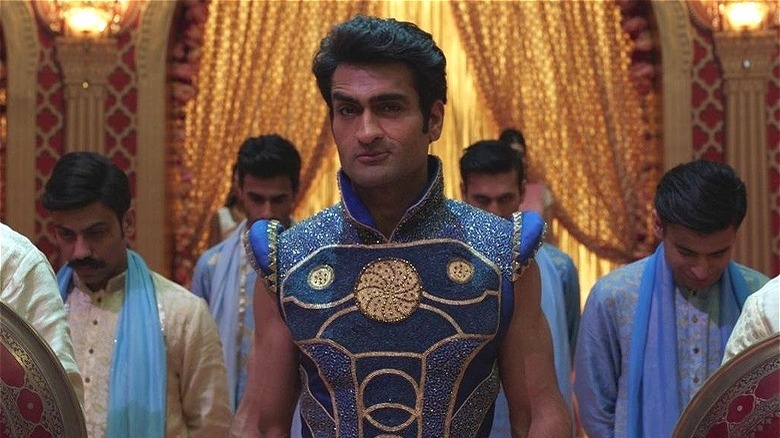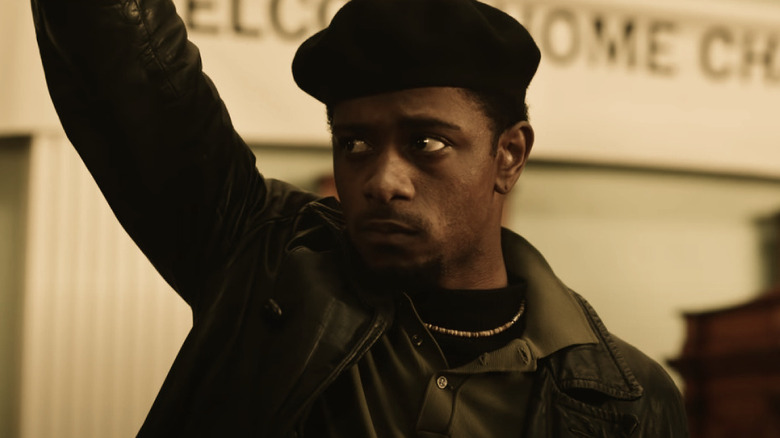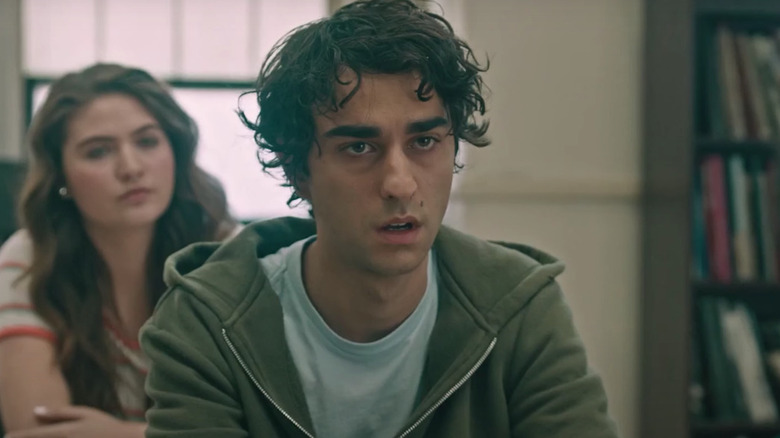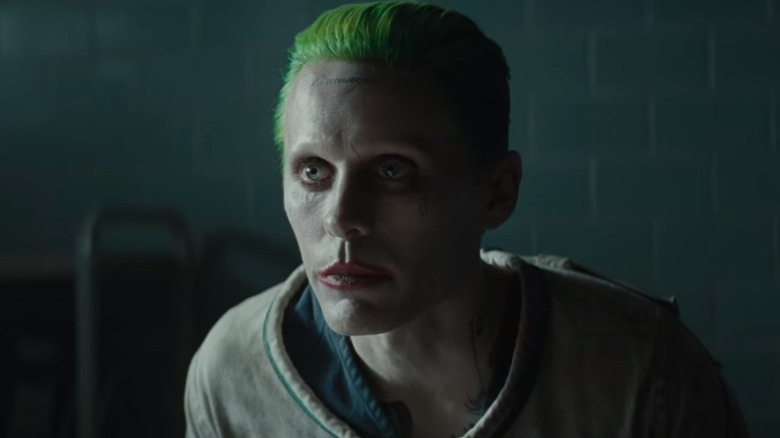Actors Who Went To Therapy Over Their Movies
Actors often put their all into making their performances believable, from drastically changing their appearance to staying in character even after the cameras stop rolling. While some actors do this through Method acting, others opt to channel their emotions into their work and create a specific mindset to use during filming. Every actor has a technique of sorts that they use to embody a character. Some are more effective than others, leading to iconic portrayals that have gone down in cinematic history.
But sometimes, the impact of those efforts linger a bit longer than the actors would like them to, and those characters impact the people who play them in ways that require them to seek help from outside parties. Dark material, playing fictional versions of real people known for illegal acts, or even the way the public reacts to a movie or role can influence how a performer feels about a project, where their head is afterward, and if the character stays with them. Here are actors who faced such challenges over the years and went to therapy because of their movie roles.
Isabelle Adjani went to therapy after filming Possession
One of Isabelle Adjani's most well-known roles is in the 1981 psychological horror film "Possession." Adjani stars as Anna, the wife of Sam Neill's Mark, who tells her husband she wants a divorce but won't give him a reason why. She also portrays Helen, the teacher of Mark and Anna's son Bob. The dual role earned the actress the award for best actress at the Cannes Film Festival and the César Award for best actress, but it wasn't without a heavy toll.
The role of Anna — who has a nervous breakdown, turns psychotic, and has sex with a hideous creature — was very emotionally and physically draining for Adjani. The actress revealed long after the film was shot that she went to therapy for several years and believed she developed post-traumatic stress disorder from working on "Possession." Further evidence of the impact playing Anna had on Adjani came from the film's director, Andrzej Żuławski, who shared in a 2000 documentary that the actress attempted to commit suicide following her portrayal of Anna.
Neill has added to the discourse by speaking about the intensity the movie required. "I call it the most extreme film I've ever made," he shared on an episode of "Kermode and Mayo's Film Review" in 2021. "He asked of us things that I wouldn't and couldn't go to now. I think I only just escaped that film with my sanity barely intact."
Lady Gaga needed a psychiatric nurse on House of Gucci
Many know Lady Gaga for her career as a musician and hits like "Bad Romance" and "Born This Way," but moviegoers may recognize her from her breakout role in the 2018 film "A Star Is Born" alongside Bradley Cooper. Television audiences might also know the singer-turned-actress from her work on Seasons 5 and 6 of "American Horror Story," and in 2021, she appeared opposite Adam Driver in "House of Gucci" as Patrizia Reggiani.
Based on a real woman convicted of hiring two hitmen to kill her husband, Maurizio Gucci, the role is another in a series of darker characters that Gaga has portrayed. In an interview with Variety, the musician said she "was always Patrizia" during production. "I always spoke in my accent," Gaga shared. "I was still living my life. I just lived it as her."
But this took a toll on Gaga, who needed mental health support while filming. "I had a psychiatric nurse with me towards the end of filming," Gaga continued. "I sort of felt like I had to. I felt that it was safer for me." She admitted that she may have taken her dedication to the role to an extreme but recognized her reasons for doing it. "I have a sort of romantic relationship with suffering for your art that I developed as a young girl, and it just sometimes goes too far," the actress stated. "And when it does go too far, it can be hard to reel it in on your own."
Dakota Johnson needed to work out her feelings after Suspiria
Dakota Johnson may be best known for her role as Anastasia Steele in the "Fifty Shades of Grey" trilogy, but it was a different part that put the actor in therapy. In 2018, Johnson appeared as lead character Susie Bannion in Luca Guadagnino's remake of the horror classic "Suspiria." The movie follows Susie as she heads to Berlin to attend a dance academy that happens to be run by witches, which begins a gruesome supernatural journey of discovery for the young woman and the other students.
In an interview with Elle in April 2018, Johnson stated that the movie "f***ed [her] up so much that [she] had to go to therapy." She expanded on that during a press conference at the Venice Film Festival (via Entertainment Weekly), saying, "When you're working sometimes with dark subject matter, it can stay with you ... to talk to somebody really nice about it afterwards is a really nice way to move on from the project." She also complimented her therapist, calling her "a really nice woman."
While she went to therapy after filming, Johnson did share that the experience of making the film itself was not difficult for her. "It was the most fun and the most exhilarating and the most joyful that it could be," the actress explained. "It wasn't that this film sent me to a ward, I just have a lot of feelings."
Michael B. Jordan's feelings needed unpacking after Black Panther
Michael B. Jordan first graced our screens with a guest role on "The Sopranos" in 1999. Since then, he's headlined major franchises like the "Creed" films and appeared in popular TV series like "Friday Night Lights." His inclusion in the Marvel Cinematic Universe as the villainous Erik Killmonger in 2018's "Black Panther" is one of his most popular roles — but also one that made him look into therapy.
While speaking with Oprah Winfrey on a SuperSoul Sunday segment, Jordan discussed how he got into the mindset of his "Black Panther" character and how he got out of it. "I think just being in that kind of, that mind state, that real unapologetic ... whatever all the time kind of, it caught up with me," the actor shared with Winfrey. "I got a little depressed." He tried to be in a "lonely place" during filming as part of channeling the emotions he needed to play Killmonger, but it came at a cost.
Jordan struggled to readjust after finishing his work on the film, but "unpacking" helped reframe his mind. He felt he had trouble accepting love because of what he forced himself to push away in preparation for playing the character, but time and going to therapy aided him in moving on from Killmonger. "Honestly, therapy, just talking to somebody, was something that really helped me out a lot," Jordan continued. "I feel everybody needs to unpack and talk."
Val Kilmer took Method acting to a new level on The Doors
While Val Kilmer is known for roles ranging from Iceman in "Top Gun" to the Caped Crusader in "Batman Forever," none of his other characters have impacted him in quite the same way as singer Jim Morrison in the 1990 film "The Doors."
The actor took a more Method approach to the role, learning 50 songs for the movie and interviewing those close to the late musician like producer Paul Rothchild. Kilmer took quite a bit of time trying to simulate everything he could about Morrison, including his appearance. "I was dieting for months," the actor told The Washington Post. "I was down to about 158 [pounds]." It has also been alleged that he had the crew call him "Jim" during production. Kilmer denied at the time that he asked the crew to avoid speaking to him and that a letter sent to the crew by the production manager asking them to stay away from the actor was not his doing.
Kilmer noted that after playing Morrison, he was "more committed to physical health" and "spiritual search" in an interview with reporter Bobbie Wygant. It was later reported that Kilmer allegedly sought out therapy after finishing the film in order to get the character out of his system.
Keira Knightley struggled with fame after Pirates of the Caribbean
Keira Knightley is now a household name, but it was her breakout role as Elizabeth Swann in the "Pirates of the Caribbean" franchise that threw the British actor into the limelight at a young age. In the years since, Knightley has opened up about how that kind of fame impacted her at the time, especially as a young woman in the industry, and how she now strives to support others who find themselves in a similar situation.
"I found that level of scrutiny and that level of fame really hard," the actress shared with Variety in 2018. "You're in some ways still a child. It was traumatic, but it set up the rest of my career." She added that she feels comfortable with where her career is today and is better equipped to handle fame after "many years of therapy" to work through how the spotlight feels. Knightley noted that she is "not an extrovert," which made it even more difficult for her at the time.
"We have to be very careful with our young women," the actress said, describing that as a lesson she took away from her experience while noting that her fame came at "a very precarious age." She added that she now tries to advocate for and mentor the young actresses she works with, saying that "everyone can be a little kinder" to young women in the industry.
Kumail Nanjiani was too aware of negative Eternals reviews
The Marvel Cinematic Universe is an immensely popular franchise, but that doesn't mean every movie is a winner. When "Eternals" came out, it was met with poor reviews from critics, leaving the film with a 47% rating on Rotten Tomatoes. Kumail Nanjiani, who portrayed the Eternal known as Kingo, revealed in an interview with the podcast "Inside of You" that the reviews led him to start therapy.
While the actor thought the movie could open up a lot of doors for him because of the director and actors attached, the less-than-stellar reviews were "very. very tough" on him. "The reviews were bad, and I was too aware of it," Nanjiani shared. "I was reading every review and checking too much." Nanjiani started to go to therapy as a result because he felt that it was taking a toll on both him and his wife to be so wrapped up in his work that way.
Nanjiani was incredibly excited to do the movie and for everyone to see it, but let himself get tied up with what everyone was saying about it. "I go [to therapy] basically every week," the actor added, admitting that he still discusses how "Eternals" impacted him with his therapist but has since figured out that he had to stop worrying about the public or critical response. Going to therapy helped him remember that he "can't control what people are gonna think of it."
Judas and the Black Messiah felt too real for LaKeith Stanfield
Audiences are sure to recognize LaKeith Stanfield from his work in popular films like "Get Out" and "Uncut Gems," but it was his role in the 2021 historical drama "Judas and the Black Messiah" that made the actor seek out therapy. Stanfield played William O'Neal, an FBI informant who was a part of the assassination of Black Panther Party state head Fred Hampton.
"With somebody like Daniel [Kaluuya], who I just respect as a human and an artist, as Fred Hampton, it felt like I was actually poisoning Chairman Fred Hampton," the actor told Level. "So sometimes your body thinks that's real, everything you're putting it through ... I realized going forward before I step into something like that again, maybe have a therapist."
While the movie helped him realize he needed a therapist, Stanfield stated he previously had a more negative view of therapy and what it could do for him. "Like I was always throwing off therapy," the actor continued. "I never wanted to try it." But he added that he planned to continue with his therapy, especially because he had found a therapist he was satisfied with and could talk with over Zoom. In addition to therapy, Stanfield shared he started utilizing yoga and meditation, which has "taught [him] a lot about [himself]."
Alex Wolff didn't want to sound pretentious about Hereditary
Alex Wolff began his acting career with brother Nat Wolff on Nickelodeon's "The Naked Brothers Band," but has since taken on intense roles under some of the industry's most well-known directors, as in M. Night Shyamalan's "Old" and Christopher Nolan's "Oppenheimer." However, it was his role as Peter in Ari Aster's "Hereditary" that caused the actor to seek out help.
Wolff shared that the Toni Collette-led project impacted his mental health. "That movie did about as much damage to me as a movie can do," the actor said. "It really affected me." He also highlighted why he doesn't like to talk about the negative impacts of his work. "You really don't want to sound pretentious or self-serious or like anything is too serious," Wolff added. "Because we have a cushy job in a lot of ways, but this, emotionally, it was one of those tough ones."
The actor said that "Hereditary" affected his emotional well-being and caused him to lose sleep as well. Considering the horrific content of the movie and what Wolff had to do in it, including banging his head into a desk repeatedly, it's no surprise the film impacted his mental health. Wolff commented to Vice that he doesn't "think [someone] can go through something like this and not have some sort of PTSD afterwards," especially considering he would "absorb the pain and let it burn" for any negative emotion he felt during production.
The cast of Suicide Squad had an on-set therapist
The 2016 film "Suicide Squad" featured some much-discussed performances, including Margot Robbie as Harley Quinn and Jared Leto as the Joker. While it was rumored that Leto really embraced his role by sending odd gifts to his cast mates, which Leto later denied, it was David Ayer's directing style that resulted in the need for an on-set therapist by the end of production to ensure the cast was emotionally okay.
"David Ayer is about realism," Adam Beach, who portrayed Slipknot, told E! Online. "So if your character is tormented, he wants you to torment yourself. He wants the real thing." The actor described the therapist as a "life coach" rather than a traditional therapist. The intent was for the cast to have someone around to talk through the darker aspects of the job so that "[they] finish a movie and don't disappear somewhere and then don't show up for work."
Beach did not comment on whether anyone took the director up on the offer and spoke with the life coach during filming, but it was made clear to the cast that Ayers did not want them to take the dark tone of the movie home with them at the end of the day. The therapist, who the actor said was a friend of the director, was there in case anyone "[fell] off the wagon and really [was] villainous."
